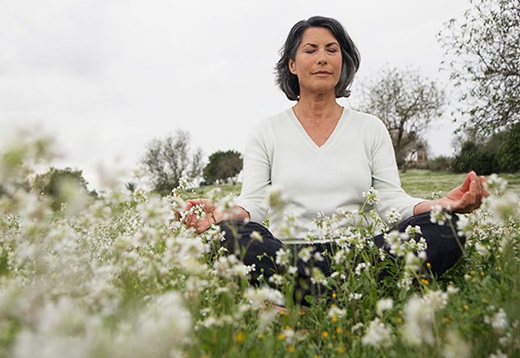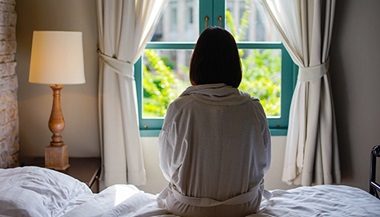Natural Relief for Depression
The lows of depression — dark moods, lack of energy, loss of joy — affect many people at some point in their lifetime. Now, a Johns Hopkins review of research suggests meditation deserves a place among the therapies shown to lift mild to moderate depression symptoms.
“Meditation has been studied for decades, but we wanted to know if it was really better than the placebo effect,” says Johns Hopkins expert Madhav Goyal, M.D., M.P.H. So he and a team of researchers reviewed 47 meditation studies, involving 3,515 volunteer patients, most of whom were not suffering from clinical depression or clinical anxiety.
Their conclusion: “Meditation appeared to provide as much relief from some depression symptoms as other studies have found with antidepressants,” Goyal says. Volunteers who took an eight-week meditation course experienced a 10% to 20% improvement in depression symptoms and a 5% to 10% improvement in anxiety symptoms. Meditation also showed similar promise to reduce pain.
Goyal notes that a 2021 review of 136 trials looked at the effects of mindfulness-based programs for depression on more than 11,000 people who did not have a medical diagnosis. “The results of that review were similar to the ones we found,” he says. “Mindfulness-based programs reduced depression to roughly the same degree when compared with an active control.

How Meditation Works for Depression
The most helpful type of meditation in Goyal’s study was mindfulness meditation — a self-awareness practice that involves focusing on the present moment and gently refocusing, without judgment, whenever attention wanders. The theory: Meditation may ease depression by stopping, for a while, the ever-churning worries and fears that can fuel it.
“If I’m depressed about a life change like divorce or losing a job and keep thinking about it, I may become more depressed. And the churning thoughts can cause a cascade of symptoms that lead to feeling debilitated,” Goyal says. “One way mindfulness may help is by causing you to pause and react less to whatever is bothering you. This process can reduce the symptoms, making them less bothersome, and over time can become second nature with more meditation practice.”
Try It Find a Meditation Expert
Curious about mindfulness meditation? “The best way to learn is with an experienced teacher,” says Goyal. “Learning to observe your mind, thoughts and emotions — without judging yourself — can be challenging.”
Find a class near you by checking on the web, with local hospitals or with your health care providers.
Could Meditation Be Right for You?
If you suspect you have depression, see your primary care doctor to rule out other causes of your symptoms and get a treatment plan. “If your doctor prescribes an antidepressant, keep taking it. Don’t stop on your own,” Goyal says. “You can add meditation and see how you feel after a few months of regular practice. The best way to get started is by taking a class.”
Though based on ancient Buddhist traditions, “mindfulness meditation is secular, not religious,” Goyal says. “Anyone can practice it. It doesn’t conflict with religious faith or spiritual beliefs.”
#TomorrowsDiscoveries: How the Brain Processes Incentives and Rewards | Vikram S. Chib, Ph.D.
Johns Hopkins researcher Vikram S. Chib studies the way incentives and rewards work in the brain and how this can lead to breakthroughs in depression treatment.
Definitions
Mindfulness meditation: A Buddhist style of meditation that helps you become more aware of your thoughts, feelings and actions and remain rooted in the present moment. During a mindfulness practice, you focus your attention on your breathing, bodily sensations or movements. This form of meditation has been shown to reduce anxiety, depression and pain.







